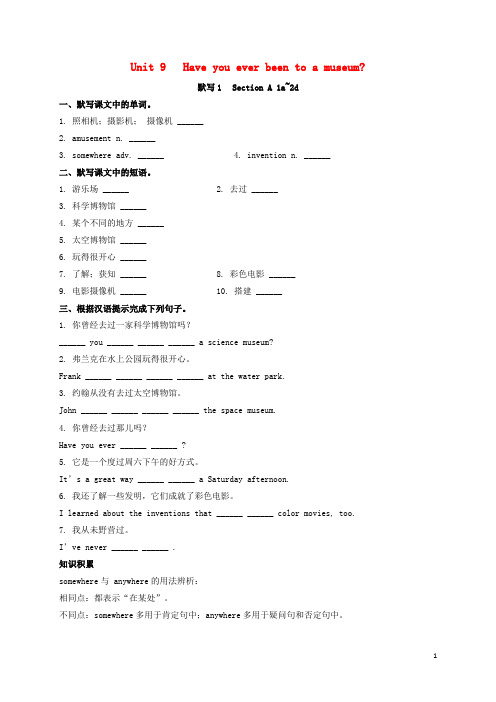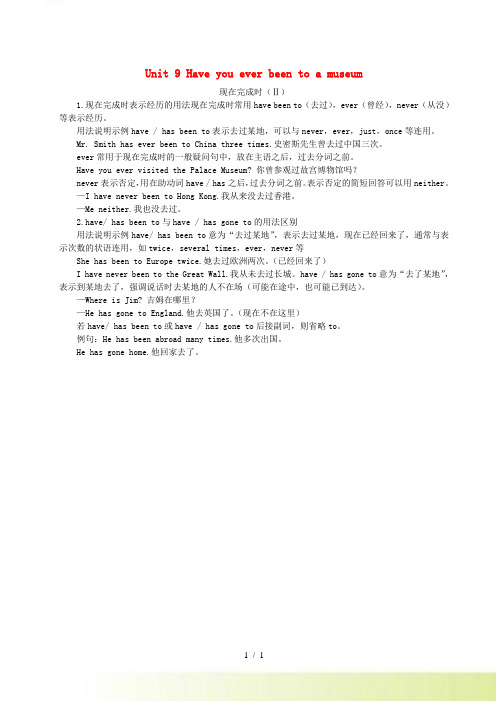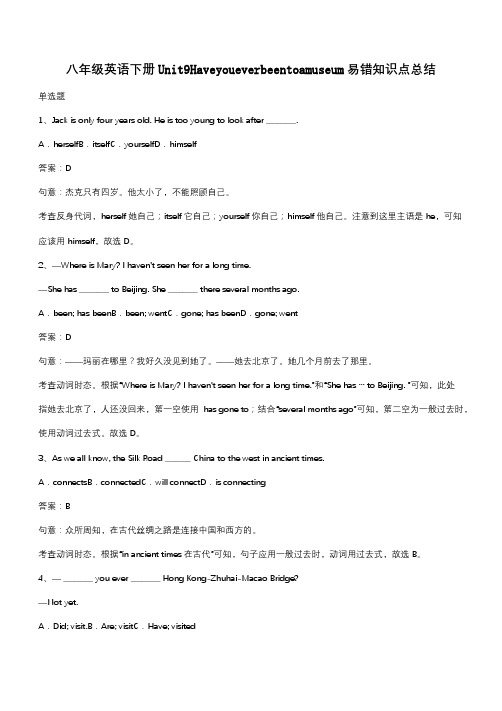浙江省温州市第二十中学八年级英语下册 Unit 9 Have y
- 格式:doc
- 大小:66.51 KB
- 文档页数:2

八年级英语下册Unit9Have...Unit 9 Have you ever been to a museumP65 1a-2b1.somewhere different 不同的地方 2.take the subway 乘地铁3.by bike 骑自行车4.have a good time 玩得高兴5.go skating 去溜冰 6.space museum 太空博物馆7.history museum 历史博物馆 8. art museum 艺术博物馆 9.at the water park 在水上公园 10.amuseumt park 游乐场P66 2b—2d1.It’s really interesting , isn’t it ?它真的很有趣,不是吗?反意疑问句疑问部分规律:前肯后否,前否后肯,前be 后be .前情态后情态。
无情无be 借助助动词。
(1.注意前为祈使句,后用will you 2.注意前有never hardly little few nothing nobody no one 后用肯定)2.lead to+v—ing 导致引起 I have never been camping 我从未野营过3.现在完成时结构:have /has been doing 定义:“某一动作从过去某一时刻开始一直持续到现在,有可能还要持续下去”与完成时区别:1.现在完成时强调动作的完成,完成进行时侧重动作的持续进行。
Eg: I have read a book about birds.我读过关于鸟的书。
(已经读完)I have been reading a book about birds 我一直在读关于鸟的书。
(一直在读,现在还在读,有可能会继续读下去)2. 现在完成时无感情色彩完成进行时表示一个动作的延续,重复,有时有一定的感情色彩 eg: She has been singing all the day (抱怨厌烦)4.invent 发明 discover 发现5.Me neither =Neither have I .我也没有去过 me neither 表否定 me too 表否定6 put up 举起搭建张贴(动副短语) put down 放下 put away 放好整理好put on 穿上上演7.A good way to do sth 一个做某事的好方法自学指导一1.I have been to Hainan twice .2.She’s not here. She has gone to Qingdao.3. He has been in London for half a year总结:have been to____________,标志词____________have gone to__________________,标志词_____________have been in__________________,标志词_____________去过某地,never/ever/once/twice/three times 等副词短语。

Unit9 Haveyoueverbeentoamuseum?一、词汇与短语◆重点单词A 局部1.amusement 消遣;玩耍n. 3.somewhere 在某处;到某处adv. 5.camera 照相机;摄影机;摄像机n. 7.invention 制造;制造物n. 9.invent 制造;制造v.2.social 社会的adj.4.peaceful 和平的;清静的adj. 6.performance 表演;演出n. 8.perfect 完善的;完全的adj. 10.itself (it 的反身代词)它自己pron.11.unbelievable 难以置信的;不真实的adj. 12.collect 收集;采集v.13.progress 进步;进展v.&n. 15.rapid 快速的;快速的adj. 17.unusual 特别的;不寻常的adj. 19.toilet 坐便器;厕所n. 14.theme 主题n.16.ride 供乘骑的游乐设施;短途旅程n. 18.province 省份n.20.encourage 鼓舞v.21.German 德国的;德语的;德国人的adj. 德语;德国人n.B 局部1.thousand 一千num. 3.safe 安全的;无危急的adj. 5.simply 仅仅;只;不过adj. 7.fear 几可怕;惧怕v.&n. 9.Indian 印度的adj. 印度人n. 2.fox 狐狸n.4.equator 赤道n. 6.spring 春天n. 8.mostly 主要地;通常adv. 10.location 地点;位置n.11.whether 不管……(还是);或者……(或者);是否conj. 12.Japanese 日本的;日本人的;日语的adj. 日本人;日语n. 13.whenever 在任何……的时候;无论何时conj.◆重点短语A 局部1.amusementpark 游乐场3.teaart 茶艺5.acoupleof 两个;一对;几个7.ahistorymuseum 历史博物馆9.aspacemuseum 太空博物馆11.anartmuseum 艺术博物馆13.awaterpark 水上公园2.learnabout 了解4.leadto 导致6.campinthemountains 在山中宿营8.putupatent 搭帐篷10.haveinformationabout 有关于……的信息12.progressinsucharapidway 进步如此快速14.acoupleoftimes 几次15.inthefuture 在将来17.haveagreattime 过得开心19.afilmmuseum 电影博物馆16.encouragesb.todosth. 鼓舞某人做某事18.somewheredifferent 某个不同的地方20.theteaartperformance 茶艺表演21.takearideontheboatforseveraldays 乘船旅行几天22.thehistoryanddevelopmentof…................. 的历史和进展B 局部1.allyearround 全年3.alotofthetime 大局部时间5.outsideofChina 在中国以外7.duringthedaytime 在白天9.becloseto 靠近;接近11.choosetodosth. 选择做某事2.thousandsof 数以千计的;许很多多的4.inthedark 在黑暗中6.anEnglish -speakingcountry 一个说英语的国家8.haveproblemsdoingsth. 做某事有困难10.thebesttimetodosth. 做某事的最好时间12.befarfrom 远离13.threequartersofthepopulation 人口的四分之三14.ontheonehand ……ontheotherhand ……一方面……另一方面……◆重点句子A 局部1.—Have youever beento thespacemuseum? —你曾去过太空博物馆吗?—Yes,Ihave.Howaboutyou? —是的,我去过。

Unit 9 Have you ever been to a museum?Section A(1a-2d)知识点一have/has been to去过某地Have you ever been to a science museum?你曾经去过自然博物馆吗?have/has been to意为“曾经去过某地”,但现在已不在那里了。
I have never been to Kunming before.我以前从没去过昆明。
My father has been to Hong Kong many times.我爸爸去过香港很多次。
1.have/has gone to意为“去了某地”,说话时该人不在现场,主语为第三人称。
—May I speak to Mr.Smith?——我可以和史密斯先生通电话吗?—Sorry,he has gone to China.——抱歉,他去英国了。
2.have been in意为“在某地”,表示在某地待了多少时间,常与表示一段时间的状语连用。
They have been in New York for five weeks.他们在纽约五周了。
知识点二反意疑问句It’s really interesting,isn’t it?它真的很有趣,不是吗?这是一个反意疑问句。
反意疑问句是由“陈述句 +附加疑问句”构成,遵循“前肯后否,前否后肯”原则。
此问句可用yes或no来回答。
附加反意疑问部分的主语要用代词,并与陈述部分主语一致,谓语动词在人称、数和时态上也要与陈述部分一致。
Linda won the speaking competition,didn’t she?琳达赢了演讲比赛,是吗?【温馨提示】1.含有never,hardly,seldom等的句子为否定句,反问部分用肯定形式。
2.反义疑问句的回答要“据实回答”,即事实是肯定的,就做肯定回答;事实是否定的,就做否定回答。
—Mary comes from England,doesn’t she?——玛丽来自英国,是吗?—No,she doesn’t.She is from the UAS.——不,不是。

八年级英语下册Unit9Have...
Unit 9 Have you ever been to a museum
这个年龄段的学生具有很强的记忆力和模仿力,也具有一定的听说读写技能和表达能力,同时也积累了一定量的词汇。
但对英语学习外,引导学生通过观察、比较、分析,自己主动发现、探究,找出一般过去时与现的培养学生合作学习、探究的学习方式。
因此我觉得单元对他们来说不会太难。
Greet the c
Ask students to rea d the sentences of Grammar focus aloud.
ou/I have.
Has he/she finished the work?
常缩略为
Have you had your lunch yet?
thi
pl ane He has gone to Beijing.
ve / has gone (to) 表示某人“已经去
(我了解这部电影的内容)
parents have come back already. ( 3. Has yo ur sister gone to the bookstore?
Translate the following phra。


八年级英语下册Unit9Have...Unit 9 Have you ever been to a museum?The Fifth Period (Section B 3a-3b, Self Check)Teaching aims(教学目标)1.掌握基本的写作技能2. 学会如何从哪些方面去描述一个国家或地区Language points(语言点)要求掌握以下句式: Have you ever been to ...?able to do sththe population ofYou can/should/will ...One great thing about … is that ...2.要求掌握以下词汇:名词:population, size, location(本节课的生词较少,而且单词的拼写比较简单,所以学生学起来不会感到困难,如果班级学生的水平较高,可以鼓励学生当堂掌握。
)Difficulties(难点):描述一个国家Teaching steps(教学步骤)1. Warm-up and Revision(课堂热身和复习)Warming up(group work)T: Work in small groups. Describe Singapore without looking at the book.Revision:T: Let’s try to translate th ese phrases into English.教学设计说明:为后面的写作作铺垫。
教学设计说明:扩大学生视野,让学生用英语思维。
为后面的阅读作好铺垫。
2. Work on Self Check: 1)T: Think a bout the things below and write an answer for each one.(教师可以四处走动,以帮助学生怎样运用现在完成时。
并对个别难懂对他们有障碍的地方进行讲解。



Unit 9 Have you ever been to a museum?默写1 Section A 1a~2d一、默写课文中的单词。
1. 照相机;摄影机;摄像机 ______2. amusement n. ______3. somewhere adv. ______4. invention n. ______二、默写课文中的短语。
1. 游乐场 ______2. 去过 ______3. 科学博物馆 ______4. 某个不同的地方 ______5. 太空博物馆 ______6. 玩得很开心 ______7. 了解;获知 ______ 8. 彩色电影 ______9. 电影摄像机 ______ 10. 搭建 ______三、根据汉语提示完成下列句子。
1. 你曾经去过一家科学博物馆吗?______ you ______ ______ ______ a science museum?2. 弗兰克在水上公园玩得很开心。
Frank ______ ______ ______ ______ at the water park.3. 约翰从没有去过太空博物馆。
John ______ ______ ______ ______ the space museum.4. 你曾经去过那儿吗?Have you ever ______ ______ ?5. 它是一个度过周六下午的好方式。
It’s a great way ______ ______ a Saturday afternoon.6. 我还了解一些发明,它们成就了彩色电影。
I learned about the inventions that ______ ______ color movies, too.7. 我从未野营过。
I’ve never ______ ______ .知识积累somewhere与 anywhere的用法辨析:相同点:都表示“在某处”。
不同点:somewhere多用于肯定句中;anywhere多用于疑问句和否定句中。

Unit 9 Have you ever been to a museum现在完成时(Ⅱ)1.现在完成时表示经历的用法现在完成时常用have been to(去过),ever(曾经),never(从没)等表示经历。
用法说明示例have / has been to表示去过某地,可以与never,ever,just,once等连用。
Mr. Smith has ever been to China three times.史密斯先生曾去过中国三次。
ever常用于现在完成时的一般疑问句中,放在主语之后,过去分词之前。
Have you ever visited the Palace Museum? 你曾参观过故宫博物馆吗?never表示否定,用在助动词have / has之后,过去分词之前。
表示否定的简短回答可以用neither。
—I have never been to Hong Kong.我从来没去过香港。
—Me neither.我也没去过。
2.have/ has been to与have / has gone to的用法区别用法说明示例have/ has been to意为“去过某地”,表示去过某地,现在已经回来了,通常与表示次数的状语连用,如twice,several times,ever,never等She has been to Europe twice.她去过欧洲两次。
(已经回来了)I have never been to the Great Wall.我从未去过长城。
have / has gone to意为“去了某地”,表示到某地去了,强调说话时去某地的人不在场(可能在途中,也可能已到达)。
—Where is Jim? 吉姆在哪里?—He has gone to England.他去英国了。
(现在不在这里)若have/ has been to或have / has gone to后接副词,则省略to。

八年级英语下册Unit9Haveyoueverbeentoamuseum易错知识点总结单选题1、Jack is only four years old. He is too young to look after ________. A.herselfB.itselfC.yourselfD.himself答案:D句意:杰克只有四岁。
他太小了,不能照顾自己。
考查反身代词,herself她自己;itself它自己;yourself你自己;himself他自己。
注意到这里主语是he,可知应该用himself,故选D。
2、—Where is Mary? I haven’t seen her for a long time.—She has ________ to Beijing. She ________ there several months ago.A.been; has beenB.been; wentC.gone; has beenD.gone; went答案:D句意:——玛丽在哪里?我好久没见到她了。
——她去北京了。
她几个月前去了那里。
考查动词时态。
根据“W here is Mary? I haven’t seen her for a long time.”和“She has … to Beijing. ”可知,此处指她去北京了,人还没回来,第一空使用has gone to;结合“several months ago”可知,第二空为一般过去时,使用动词过去式。
故选D。
3、As we all know, the Silk Road _______ China to the west in ancient times. A.connectsB.connectedC.will connectD.is connecting答案:B句意:众所周知,在古代丝绸之路是连接中国和西方的。
考查动词时态。
根据“in ancient times在古代”可知,句子应用一般过去时,动词用过去式,故选B。
![英语八年级下册Unit9Haveyoueverbeentoamuseum[A3]](https://img.taocdn.com/s1/m/5451ecd6f71fb7360b4c2e3f5727a5e9856a27eb.png)

教学设计Listen again. Listen and check the boxes. Have these students ever been to these places?SciencemuseumHistorymuseumArt museum NaturemuseumSpace museum ClaudiaSarah √Step 5 SpeakingAsk and answer in pairs:A: let’s go somewhere different today.B: OK. Where do you want to go?A: Have you ever been to the space museum?B: No, I haven’t. How about you?A: …Step 6 Listening 2a 2bListen and circle the places that you hear.Listen again and circle T for true or F for false.Conversation 11. Tina went to the space museum last year. T/F2. John has never been to the space museum. T/F3. They are going to take the subway. T/FConversation 21. Linda has been to the amusement park. T/F2. Linda went to the amusement park yesterday. T/F3. Linda is going to the amusement park again by bike. T/FConversation 31. Frank had a great time at the water park. T/F2. Frank’s friend has never been to the water park. T/F3. Frank and his friend are going skating. T/FAnswer: TFT TFT FTTSpeakingLook at the map in 2a and make conversations about the places.A: Have you ever been to the space museum?B: Yes, I have. How about you?A: No, I haven’t.B: Oh, it’s fantastic. Let’s go tomorrow.A: OK. How are we going to get there?B: We can take the subway.SpeakingRole-play the conversation in 2d.Step 1 RevisionWhat do you know about Singapore?position: Where is Singapore?position: in Southeast AsiaPopulationMore than three quarters of the population are Chinese.LanguageChinese and English.FoodA lot of food from China, such as rice, noodles and dumplings.Indian food, western food and Japanese food.ZooSingapore has a special zoo called the “Night Safari”. A lot of animal only wake up at night, so this is the best time to watch them.WeatherThe temperature is almost the same all year round.Step 2 Writing3b Write an article to advertise your hometown or a place you have been to.句型:Have you ever tried/seen/been…?If you…, you will/can…You should…One great thing about …is…Step 3 Self check1. Think about the things below and write an answer for each one.1) One thing that you have collected before:_________________________________2) One invention that you have found to be very useful:_________________________________3) One unbelievable or unusual thing that you’ve seen or hea rd recently:_________________________________4) One way that you’ve used to encourage a friend in the past:_________________________________5) One peaceful and quiet place that you’ve been to recently:________________________________( )35.Which one can be the best title?A. Different animals in TanzaniaB. The ways of traveling in TanzaniaC. Why do we take a bus to travel?D. The beautiful country-TanzaniaBWhen you are in England,you must be very careful in the street because the traffic drives on the left. Before you cross a street,you must look to the right first and then the left. If the traffic lights are red,the traffic must stop. The people on foot can cross the road carefully. If the traffic lights are green,the traffic can go. The people on foot must not cross. In the morning and in the evening when people go to or come from work,the streets are very busy.When you go by bus in England,you have to be careful,too. Always remember the traffic moves on the left.So you must be careful. Have a look first or you will go the wrong way. In many English cities,there are big buses with two floors. You can sit on the second floor. From there you can see the city well. It is very interesting. ( )36.When you are in England, you must be more careful in the street because________.A. there are many cars and buses on the roadB. there are no traffic lightsC. the buses and cars move on the leftD. people on foot may cross the road( )37.In England,before you cross a street, you must look to first and then________.A. the right;the leftB.the left;the rightC. the front;the backD. the back;the front( )38. If the traffic lights are green, can go, mustn’t cross.A. the people on foot;the trafficB. the traffic;the people on bikeC. buses;carsD. the traffic;the pe ople on foot( )39. In England, you must always remember that the traffic _______.A. is busyB. moves on the leftC. moves on the rightD. with two floors ( )40. In many cities in England, there are big buses ________.A. with a lot of people in themB. with lots of seats in themC. with two floorsD. with interesting colors五.单词拼写(共10小题;每小题1分,满分10分)http://w ww.xkb 1. comA)根据首字母及汉语提示,完成下列单词的拼写,使句意明确,语言通顺。

八年级英语下册Unit+9+Have+you+ever+been+to+a+museum英语说课稿一、教材分析:1、教学内容:本单元是Go for it ( 下) Unit 9。
主要围绕“Have you ever been to a museum?”这一主题展开各种教学活动,并以这一主题引出现在完成时的一般疑问句,否定句以及特殊疑问句等语言功能。
本单元旨在创造一个轻松、愉快的学习、交流环境,通过听、说、读、写来培养学生综合运用这些知识的能力。
并让学生能在“做中学”(l earning by doing),通过有限的课堂实践活动,拓展以往的经历,能准确地用英语来表达。
2、教材的地位和作用:八年级下九单元Have you ever been to a museum?讲述的是现在完成时的用法,这是初中非常重要的时态之一。
学生们能够用现在完成时来表达自己的经历,来体会别人的感受是很重要的。
这个单元一定要体会现在完成时的真正含义和用法。
要避免混淆几个重点词组的使用。
我们更要使学生不仅理解枯燥的语法,还要让学生们会用新学的语法知识来表达思想。
3、教材的处理:根据《英语课程标准》(实验稿)关于总目标的具体描述,结合本单元这部分的教学内容及基于对教材的分析,我对本单元的内容进行如下处理,目的是突出重点,使课堂节奏紧凑,衔贯。
本单元分为四课时,第一课时是Section A,第二课时是Section B, 第三课时是Self Check, 第四课时是Reading,最后一部分是做练习,以学生的自测为主,然后予以校对。
二、教学目标:根据以上我对本单元教材内容的分析,我确定以下几个为本单元的教学目标:语言知识、语言技能、学习策略、情感态度和文化意识五个方面。
§1.语言知识:本单元要求学生掌握以下词汇(neither, theme, end up, especially, disc over, population, simply, fear, whenever)语言功能:学习和增加阅读技巧和阅读策略。
Unit 9 Have you ever been to an amusement park
1.学习目标:掌握“have been to ” (曾经去过…) 的用法。
2.课前预习:
思考一下你曾经去过的一个地方,完成下面的思维导图 (Where,when,who,what,how …)
I went to ______ ________. I went there ____________. And I went there with _______ by _______. I had a great time there. I did a lot of things there. I __________________, _______________.... It was a great place to have fun, and I want to go there again.
3.课中完成任务:
A: Have you ever been to a/an …?
B: Yes, I have.. I’ve ever been there . / No, I haven ’t.. I’ve never been there Name Zoo Amusement park Water park Space meseum I My partner
4.综合运用:问一问你身边的同学:他/她曾经去过的地方,分享一下你们的经历。
name ever been to … when who how w hat … I My friend 1
My friend 2
Report: I have been to … I went there …. And I went there with ….by … I did a lot
of things there. I …
My friend ** has been to … He/She went there … And he/she …. ….
5. 课后巩固练习:
2) A: _____ you ever _____ ___ ____ (a/an) Amusement Park ? B: No, I ______. I ‘ve _____ been there. What about you? A: Me ________.
______(where ) (When) _____ …ago In May 2012 /…
Last month/week/year.
When I was …
1)我曾经去过一个游乐园。
》》改为疑问句,并作答。
__________________________________ _________________________________________ 2)Tom曾经去过一个aquarium。
》》改为疑问句,并作答。
__________________________________ _________________________________________。